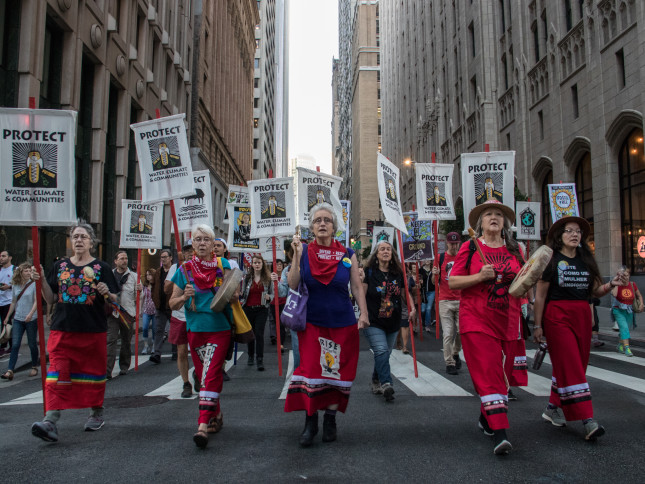-
Divesting Won’t be Enough to Achieve Climate Justice
July 14, 2020 By Kate Neville
A quiet disruption to the established financial order is underway: Around the world, institutions are pulling their investments out of fossil fuels. Climate activists campaigning for divestment suggest that such economic rearrangements might keep oil, gas, and coal in the ground, curbing carbon emissions. In parallel, some high-profile advocates call for reinvestment in renewable energy. But can the financial sector really drive the structural changes needed to address climate change—and, more fundamentally, climate justice?
In the journal Global Environmental Politics, I argue that divestment can maintain the status quo as readily as it can disrupt power. Without questioning reinvestment and the current political economic order, activists might reinforce, rather than dismantle, systems of environmental and social harm.
Full disclosure: I am part of a divestment campaign at the University of Toronto. We are urging the administration to follow the lead of other universities that have eschewed fossil fuel stocks. Higher education institutions must acknowledge the existential threat of climate change and demonstrate material leadership by turning away from fossil fuels. Yet, while divestment can be a disruptive tool, climate activists must not see it as an end goal.
Systemic problems
Even in the midst of a global pandemic, and as protests against racism and police brutality fill the streets in the United States, advocates for divestment press on. To some, public health threats, white supremacy, and climate change might seem like disparate crises. Yet, as long-standing research on environmental (in)justice has revealed, and as essayists and journalists have recently underscored, these challenges are intertwined. COVID-19 and climate change both lay bare existing inequalities and exploitation. Those of us working for climate action, then, must grapple with whether redirecting funds from fossil fuels to other sectors will challenge these deeper systemic problems.
If climate change is the root problem, and fossil fuels the cause, divestment from the sector should transform society. Many experts hold out hope that renewable energy will lead to more equitable energy supplies and democratic societies. But others doubt that substituting renewable for fossil fuel energy will solve the fundamental challenges of capitalist accumulation. As scholar Jason Hickel writes in a Guardian op-ed, “What would we do with 100 [percent] clean energy? Exactly what we are doing with fossil fuels: raze more forests, build more meat farms, expand industrial agriculture, produce more cement, and fill more landfill sites, all of which will pump deadly amounts of greenhouse gas into the air.” If climate change is just a symptom of a larger imbalance in our politics and economies, then undoing the fossil fuel industry alone will not suffice.
Divestment can reinforce market logic. Although divestment advocates might make moral arguments for defunding fossil fuels, institutions often respond to economic persuasion. In September 2019, for instance, the University of California justified its move to fossil-free investments by pointing to its fiduciary duties to limit financial risk. These investors move their money out of fossil fuels, turning instead to other profit-generating sectors. Such an economic growth-oriented solution to climate change maintains and expands the current economic order.
Reinvesting for the climate?
But there are thorny relationships between contemporary economic systems and injustice—environmental and social harms also arise in non-fossil fuel sectors. Activists concerned about climate justice must scrutinize the direct and indirect impacts of redirected finance, from environmental impacts to labor conditions to corporate control. Even if fossil fuel divestment reduces carbon emissions, reinvestment efforts might intensify damage to people and the planet in other ways. Agriculture and renewable energy both provide illustrative and cautionary examples.
Deep contradictions characterize the global agricultural system, as scholar Jennifer Clapp makes clear in an op-ed on global flows of food. The fragility of the food system intensifies the challenges of the pandemic, but is not new. Still, new financial vehicles have intensified the concentration of corporate power in agriculture. Driven by mega-corporations, these contemporary agri-food systems depend heavily on migrant labor, disregard workplace safety and well-being, harm local communities and small-scale farmers, and compromise environmental integrity. Further, while not a fossil fuel extraction industry, agricultural production contributes significantly to carbon emissions.
If agriculture is complicated, what about renewable energy? Energy production of all kinds imposes local (and sometimes global) costs: From hydropower dams to wind farms to solar arrays, these systems require land, water, and labor, generate waste, and displace communities. The World Bank anticipates substantial increases in demand for metals and minerals in a renewable-powered future, with these energy technologies linked to mining and its attendant harms. Further, although renewable energy can be produced and distributed through small-scale, local systems, such an approach might not generate the high returns on investment needed to attract capital.
Beyond the financial system
If solving climate change merely shifts ecological and social damage, the value of divestment becomes fuzzy. Can we really financially innovate our way out of environmental collapse? It is a challenging time to ask this question, as COVID-19 cases multiply, unemployment rates soar and global food insecurity surges to record rates. Yet the communities experiencing the most harm from the pandemic are already among the most vulnerable in the existing economic system. Our current moment offers the opportunity to envision an economy and global order that does not replicate current patterns of unsustainable extraction and labor exploitation.
At least in the United States, the public is interested in climate policies that also address social inequality. We know from urban studies that even well-intentioned energy policies can have perverse negative consequences for racialized and immigrant communities. Thus, when developing climate change strategies, close attention is needed to prevent unintended and spillover effects. Divestment may be a short-term strategy to unsettle the current dominance of fossil fuels and create space for envisioning new futures. However, to chart a path for climate justice, divestment campaigns must ask more critical questions about the role of finance and work to radically reorient our social and economic systems.
This post was based on the article, “Shadows of Divestment: The Complications of Diverting Fossil Fuel Finance.”
Kate J. Neville is an Assistant Professor at the University of Toronto, cross-appointed to the Department of Political Science and the School of the Environment.
Sources: BBC, “Food,” by Jennifer Clapp, Global Environmental Politics, Go Fossil Free Grist, Huffington Post, International Renewable Energy Agency, Johns Hopkins, Los Angeles Times, Pew Research, Quartz, Relief Web, Review of International Political Economy, The Canadian Geographer, The Guardian, The Narwhal, The New York Times, The Washington Post, The World Bank, University of Michigan, University of Toronto, UN News, Verso, Yale.
Photo credit: Climate Strike for Climate Justice, courtesy of Flickr user Peg Hunter.
 A Publication of the Stimson Center.
A Publication of the Stimson Center.






